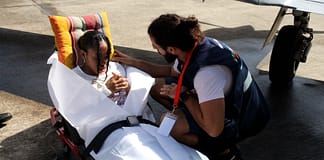
As the Hurricane Irma disaster response and clean-up campaign continue, the Ministry of Health and the Environment will be zooming in on the health risk factors and on Barbuda this weekend.
During a high-level stakeholders meeting at his office today (Thursday, September 14th)), Chief Health Inspector, Lionel Michael announced a major clean-up and eradication effort for the sister isle, which will start on Friday.
The three – day exercise will conclude on Sunday and Michael declared that the very first job that will be tackled will be the burying of the dead rotting animals while the mosquito eradication program will be second on the agenda.
“First and foremost, we want to deal with the dead animals in Barbuda. A lot of animals died and we are going to deal with them, we are making plans to go down and deal with them. We want to get rid of the mosquitoes because as we predicted and forecasted after the storm, we are going to have an increase in the number of mosquitoes in Barbuda and so we want to descend upon Barbuda this weekend,” said Michael.
The Chief Health Inspector outlined the many steps that will be taken in the vector control process, stating that all legally allowed methods will be employed to get rid of the various species.
“We will carry out oiling, we will carry out larvicidal treatment on the premises, the cisterns and the tanks to deal with the mosquitoes that transmit Zika, the Aedes Aegypti, the mosquito that transmits chikungunya, dengue and so on and we will deal with the nuisance mosquito. That’s the mosquito everybody is talking about, where we see on television people brushing and so on, that mosquito is very voracious and very aggressive in its biting because it needs blood to lay more eggs. So we have fogging machines and the requisite chemicals to carry out the attack against the mosquitoes down there.”
When asked about the number of dead animals and the problems that the carcasses pose, the Chief Health Inspector had this to say:
“When I was over there last Thursday, I counted about thirty goats and other small ruminants and now they have donkeys and horses and other animals dying and so forth. That must be dealt with because if we don’t deal with that situation they are going to decompose, they are going to rot and they are going to breed flies and so we are not only going to have a mosquito problem, we will also have a fly problem,” he said.

With regards to the clean-up efforts, Michael said that they will be working hand in hand with the Antigua Public Utility Authority (APUA) to ensure a safe and speedy recovery effort.
“We have to work with APUA because there are tremendous amounts of electrical cables on the ground which in my view are reusable. And so if we don’t do that, the cables are going to affect the speed of cleaning and how we take up the rubble, galvanize, tree branches and other rubbish from. I estimate that if we get the requisite equipment, the backhoes, the trucks, the front end loaders, the labour, we can clean up Barbuda in two weeks,” he noted
Just over a week ago, the twin island state, particularly Barbuda, was hit by Hurricane Irma, which has been described by meteorologists as the strongest ever recorded storm in the Atlantic Basin.
The ensuing destruction on the sister isle forced the government to evacuate all residents from Barbuda to Antigua.
Advertise with the mоѕt vіѕіtеd nеwѕ ѕіtе іn Antigua!
We offer fully customizable and flexible digital marketing packages.
Contact us at [email protected]















